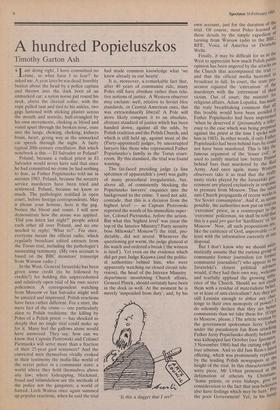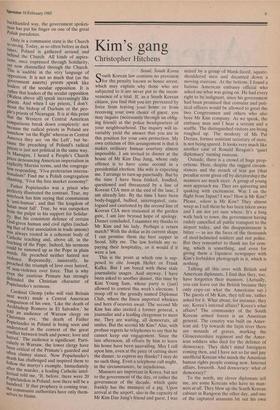A hundred Popieluszkos
Timothy Garton Ash
T am doing right, I have committed no
crime, so what have I to fear?' he asked me. A, year later he was dead: horribly beaten about the head by a police captain and thrown into the dark boot of an unmarked car; a nylon noose put round his neck, above the clerical collar, with the rope pulled taut and tied to his ankles, two gags fastened with sticking plaster across the mouth and nostrils; half-strangled by his own movements, choking as blood and vomit spurt through the broken nose, ooze into the lungs, choking, choking; kidneys brain, heart, giving way as the unmarked car speeds through the night. A fairly typical 20th-century crucifixion. But which notebook is this — El Salvador or Poland?
Poland, because a radical priest in El Salvador would never have said that since he had committed no crime he had nothing to fear, as Father Popieluszko told me in autumn 1983. Poland, because the security service murderers have been tried and sentenced. Poland, because we know so much. The pathologist testified in open court, before foreign correspondents. May it please your honour, here is the gag. Notice the blood and vomit. I will now demonstrate how the noose was applied. `Did you listen last night?' people asked each other all over Poland, and no one needed to reply; 'What to?'. For once, everyone meant the official radio, which regularly broadcast edited extracts from the Torun trial, including the pathologist's nauseating testimony. (My own account is based on the BBC monitors' transcript from Warsaw radio.) In the West, General Jaruzelski has been given some credit (to be followed by credits?) for holding this unprecedented and relatively open trial of his own secret policemen. A correspondent watching from Moscow or San Salvador might well be amazed and impressed. Polish reactions have been rather different. For a start, the mere fact of the crime — one particularly alien to Polish traditions: the killing by Poles of a Polish priest — has shocked so deeply that no single trial could make up for it. Many feel the gallows alone would have answered. They say: how can we know that Captain Piotrowski and Colonel Pietruszka will serve more than a fraction of their 25-year gaol sentences? And the convicted men themselves vividly evoked in their testimony the mafia-like world of the secret police in a communist state: a world where they hold themselves above any law; where kidnapping, blackmail, fraud and intimidation are the methods of the police not the gangsters; a world of hatred- Lech Walesa once again summed up popular reactions, when he said the trial had made common knowledge what 'we knew already in our hearts'.
It is, moreover, a remarkable fact that, after 40 years of communist rule, many Poles still have absolute rather than rela- tive notions of justice. A Western observer may exclaim: well, relative to Soviet bloc standards, or Central American ones, this was extraordinarily liberal! A Pole will more likely compare it to an absolute, abstract standard of justice which has been handed down, against all the odds, by Polish tradition and the Polish Church; and which is still held up, against most of the (Party-appointed) judges, by uncorrupted lawyers like those who represented Father Popieluszko's family in the Torun court- room. By this standard, the trial was found wanting.
The fat-faced presiding judge (a fine specimen of apparatchik's jowl) was guilty of many procedural irregularities, but, above all, of consistently blocking the Popieluszko lawyers' enquiries into the background to the crime. 'I need not add, comrade, that this is a decision from the highest level' — so Captain Piotrowski reported the words of his immediate super- ior, Colonel Pietruszka, before the action. But what this 'highest level' was (near the top of the Interior Ministry? Party security boss Milewski? Moscow?) the trial, pre- dictably, did not reveal. Whenever the questioning got warm, the judge glanced at his watch and ordered a break (`the witness is tired'). Yet even on the evidence which did get past Judge Kujawa (and the politic- al authorities behind him, who were apparently watching on closed circuit tele- vision), the head of the Interior Ministry department monitoring Church affairs, General Platek, should certainly have been in the dock as well. At the moment he is merely 'suspended from duty', and, by his 'Is this a dagger that I see?' own account, just for the duration of the trial. Of course, most Poles learned all these details by the simple expedient of turning from Warsaw radio to the BBC' RFE, Voice of America or Deutsche Welle.
Finally, it may be difficult for us in the West to appreciate how much Polish public opinion has been angered by the attacks on the Church that accompanied the trial — and that the official media hastened to broadcast in full. In court, the state Pro- secutor equated the 'extremism' of the murderers with the `extremism' of their victim. Out of court, the minister for religious affairs, Adam Lopatka, has made the truly breathtaking comment that all this trouble would have been avoided it Father Popieluszko had been imprisoned `when he deserved it' (presumably a refer,," ence to the case which was being prepare. against the priest at the time I spoke Wi' him in 1983). In other words, if only Father Popieluszko had been behind bars he could not have been murdered. This is like the famous argument of the 'lesser evil', as used to justify martial law: better Poland behind bars than murdered by the Red Army. And once again, many Westeg observers take it as read that the reaw nasty tricks played by the Jaruzelski gelv- ernment are exclusively in resports., to pressure from Moscow. Thus the rablv anti-Church propaganda of recent weeks is `for Soviet consumption'. And if, as seals possible, the authorities now put on trial an `extremist' priest, as a counterpart to the `extremist' policeman, we shall be told that this is a quid pro quo for 'hardliners' or 'Or Moscow'. Now, all such propositions are' like the existence of God, unprovable ---ar least with the information currently at 00' disposal. But I don't know why we should auto i matically assume that the curious group °f communist former journalists (or fornle`,. communist journalists?) who appear to be Jaruzelski's closest political advise would, if they had their own way, welcotilnie and tearfully applaud the growing ioutii ence of the Church. Should we not ered them with a residue of materialistic belief' or at least of anti-clericalism? Are they 11t still Leninist enough to abhor any ell: i lenge to their own monopoly of power' do solemnly declare that they are bete' communists than we take them for.1(C°E„Y to Moscow, please.) The article written the government spokesman Jerzy Urban Q under the pseudonym Jan Rem attacking Father Jerzy Popieluszko shortly before en/ was kidnapped last October (see Spectatori 3 November 1984) had the cutting edge ° t true atheism. And so did Jam Rem's latesd offering, which was prominently repririte by the leading Polish newspapers at t'' height of the trial. In this characteristically witty piece, Mr Urban protested at the defamation of atheists by Christian s°. `Some priests, or even bishops, give consideration to the fact that non-believe also have feelings which may be hurt.' Pity the poor Government! Yet, in his funny
backhanded way, the government spokes- man has put his finger on one of the great Polish paradoxes.
Only in a communist state is the Church 59 strong. Today, as so often before in dark times, Poland is gathered around and behind the Church. All kinds of aspira- tions, once expressed through Solidarity, are now channelled through the Church. This is audible in the very language of opposition. It is not so much that (as the government asserts) priests ispeak like leaders of the secular opposition. It is rather that leaders of the secular opposition. (Walesa above all) speak increasingly like Priests. And when I say priests, I don't mean the bishop of Durham or the peo- ple's priests of Nicaragua. It is at this point that the Western or Central American
because break down completely: not
necause the radical priests in Poland are somehow 'on the Right' whereas in Central America they are 'on the Left', but be- e the preaching of Poland's radical Priests is just not political in the same way. In Managua, I heard a People's Church Priest denouncing American imperialism in explicitly Marxist terms, and the congrega- tion responding, 'Viva proletarian interna- tionalism!' Find me a Polish congregation Chanting, 'Viva the free market economy!'
Father Popieluszko was a priest who Perfectly illustrated the contrast. True, my notebook has him saying that communism is 'anti-human', and that 'the kingdom of Satan must fall'. True, he was outspoken from the pulpit in his support for Solidar- ity. But his consistent defence of certain 20d-given human and civil rights (includ- ing that of free association in trade unions) Was always rooted in a coherent body of Catholic teaching and, above all, in the teaching of the Pope. Indeed, his sermons could be summed up as the Pope in plain words. He preached neither hatred nor violence. Repeatedly, insistently, he preached the triumph of love over hatred, of non-violence over force. That is why even the cautious Primate has strongly defended the Christian character of Popieluszko's sermons.
Cardinal Glemp (who will visit Britain next week) made a Central American eftparison of his own. 'Like the death of Archbishop Romero in El Salvador,' he told an audience of Warsaw clergy on Christmas eve, 'the death of Father Popieluszko in Poland is being seen and understood in the context of the great conflict between truth and power, love and hatred.' The audience is significant. Parti- cularly in Warsaw, the lower clergy have been critical of the Primate's guarded and often clumsy stance. Now Popieluszko's death has challenged and inspired them to Mow the martyr's example. Immediately after the murder, a leading Catholic intel- lectual told me, 'If, before, there were 20 Popieluszkos in Poland, now there will be a hundred.' If that prophecy is coming true, the communist authorities have only them- selves to blame.















































 Previous page
Previous page